

Jeremy Corbyn's maximum wage: politically, economically, socially and morally wrong. State pension: take it now, or defer – for more? ALEX BRUMMER: A downturn with echoes of the last great crash. The risks of a new global slump have increased considerably as share markets around the world collapsed in the latest trading.

In Britain and Japan the stock markets are now in what the experts describe as ‘bear territory’, having dropped more than 20 per cent from recent peaks. In the US, shares have gone into freefall and across Europe’s troubled southern tier there are fears of a banking crisis as severe as that of 2007-08. At the core of the current global turmoil is the unexpected collapse in oil prices. In America the price of US crude fell 5.2 per cent to its lowest level since 2003 in latest trading, and the price of Brent crude – on which UK petrol prices are based – plummeted 3.8 per cent to $27.67. Eighteen months ago they were above $100 a barrel. FTSE 100 index tumbled 203.22 points to 5673.58 on Wednesday, its lowest level in more than three years But this time it is different. Markets do not always successfully predict recession. FTSE 100 index makes positive start despite steep falls for Asian markets as investors take stock of torrid 2016.
British savers and investors were watching the London stock market nervously today as the Footsie hovered in positive territory after a torrid start to 2016.

Markets across Europe were largely in the black despite sharp falls overnight on Asian markets, with the FTSE 100 index last 28 points or 0.5 per cent up at 5,701.7. Fears remain however that Western economies sit on the edge of a financial crisis comparable to that of 2008. Global turmoil saw £52billion wiped off the value of British shares yesterday as investors panicked over slumping oil prices and slowing growth in China.
The falling oil price and Tuesday’s IMF downgrade of global growth led to what one analyst described as a ‘toxic cocktail’ dragging world markets further into the red. Are we really on the brink of another financial meltdown? Writes ALEX BRUMMER. The new year is off to a disastrous start for investors and for policymakers, with more than £1.5 trillion wiped off share values around the world.

One of Britain’s biggest financial groups, the Royal Bank of Scotland, is so spooked that its top strategist has warned people to ‘sell (mostly) everything’ because the situation is ‘very dangerous for every investor in the world’. Even George Osborne’s former economic guru Rupert Harrison has pronounced that Britain, and the Chancellor’s economic fortunes, are ‘at the mercy of the global economy’. One of Britain’s biggest financial groups, the Royal Bank of Scotland, is so spooked that its top strategist has warned people to ‘sell (mostly) everything’ It may not yet be a ‘Lehman moment’ — the investment banking collapse that precipitated the crash of 2008-9 and the deep recession which followed — but indications that world prosperity is on a precipice grow more ominous by the day.
Then there is the China problem. Interest bill on UK's £1.27 trillion debt to hit £1bn a week. Public sector net borrowing excluding one-off payments related to Royal Mail's pension plan and quantitative easing gilt coupon transfers, stood at £11.5bn in April, according to the Office for National Statistics (ONS).
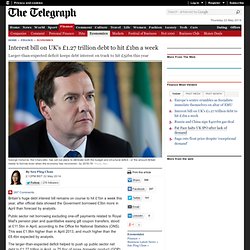
This was £1.9bn higher than in April 2013, and much higher than the £8.4bn expected by analysts. The larger-than-expected deficit helped to push up public sector net debt to £1.27 trillion in April, or 75.6pc of gross domestic product (GDP). Government borrowed £1.3billion more in July as spending rose across Whitehall. Borrowing usually falls in July but this year it has soared insteadPublic sector borrowed nearly £500m compared to £800m surplus last yearDeficit attributed to higher Government spending despite tax rises By Hugo Gye Published: 11:16 GMT, 21 August 2013 | Updated: 12:29 GMT, 21 August 2013.

£2,228,300,000,000 and falling – the UK’s national debt. Public sector net debt when Labour came to power in 1997 was running at 40.5% of our total national income.
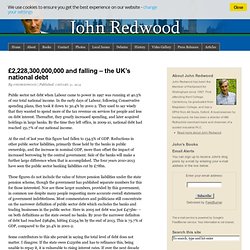
In the early days of Labour, following Conservative spending plans, they took it down to 30.4% by 2001-2. They used to say wisely that they wanted to spend more of the tax revenue on services for people and less on debt interest. Thereafter, they greatly increased spending, and later acquired holdings in large banks. By the time they left office, in 2009-10, national debt had reached 151.7% of our national income. Britain's credit rating downgraded from AAA to AA+ by leading international agency.
Fitch downgraded Britain because of 'weaker economic and fiscal outlook' It is second international agency to strip UK of top-notch credit ratingIt means borrowing costs for households and businesses could increase'This is another humiliating blow' said shadow chancellor Ed Balls By Alex Brummer and Hugo Duncan.

The Great Welfare Myth: The chattering classes are peddling a poisonous myth - that the poor cannot survive without the soul- deadening embrace of welfarism. By Brendan O'neill PUBLISHED: 22:22 GMT, 5 April 2013 | UPDATED: 12:44 GMT, 8 April 2013.
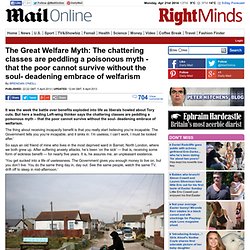
Britain's debt mountain reaches £1.39TRILLION, equivalent to 90% of the entire economy, ONS reveals. Gross debt at the end of 2012 stood at £1.387trillion, up 7% on 2011Vast sum is equivalent to 90% of GDP - up from38% a decade agoFigures used to compare UK to the rest of EuropeMounting debts reveal the devastating impact of the 2007 crash By Matt Chorley, Mailonline Political Editor Published: 11:40 GMT, 3 April 2013 | Updated: 11:51 GMT, 3 April 2013.
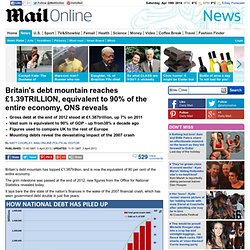
New fears about inflation as ONS quietly downgrades RPI. RPI has consistently produced higher figures than CPI to show how rising prices are pushing up the cost of living New fears about inflation and how official statistics may understate the rate at which the real value or purchasing power of money is being eroded are raised by the United Kingdom Statistics Authority (UKSA) surprise decision that the Retail Prices Index (RPI) “will no longer be designated as a national statistic”.
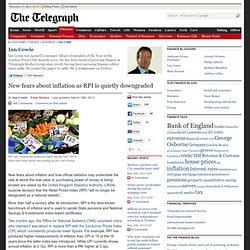
More than half a century after its introduction, RPI is the best-known benchmark of inflation and is used to uprate State pensions and National Savings & Investments index-linked certificates. Two months ago, the Office for National Statistics (ONS) surprised critics who claimed it was about to replace RPI with the Consumer Prices Index (CPI) which consistently produces lower figures. Do you still think those Coalition cuts are savage? We’re heading for economic dictatorship.